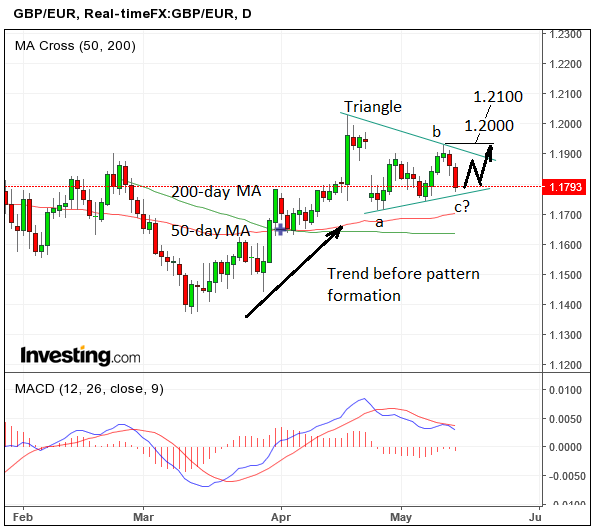GBP/EUR Rate: Recovery Potential
It's been a strong start to the new week for the Pound to Euro exchange rate which is seen trading higher and our studies suggest further gains are possible.

- Latest Foreign exchange reference rates:
- 1 GBP = 1.1801 EUR
- 1 EUR = 0.8475 GBP
The Pound to Euro exchange rate (GBP/EUR) has been moving in a sideways range over the last few weeks leaving market participants wondering whether that strong run that has been in place since mid-March is still valid.
Our analysis suggests that when the pair breaks out it is marginally more likely to break higher than lower, due to prior price action which was up.
The sideways range looks like an incompletely formed triangle which has just finished its ‘c’ wave – triangles have a minimum of five waves (labelled a-e) - so we are halfway there.
A break above the ‘b’ wave highs at 1.1931 would be required to confirm a move up to an initial target at the psychologically significant 1.2000 barrier, and then followed by 1.2100, based on calculating the target using the height of the triangle at its widest point.
The pair is above its 50 and 200-day moving averages which support the prospect of more upside.
Sterling Outperforming
It has been a strong start to the new week for Sterling which is seen trading higher against the likes of the Dollar, Yen and Euro.
But, against the commodity price-linked currencies such as the Australian and New Zealand Dollars, losses appear to be the order of the day as a positive tone across global financial markets appears to be aiding this sector of the market.
Inspiring commodity prices and their related currencies was the boost received by oil prices after Saudi Arabia and Russia signalled their support for a new deal to cut production levels until end of March 2018.
Brent crude gained 1.5%, moving to $51.62 per barrel.
"Russia and Saudi Arabia together produce about 20 million bpd of crude, equivalent to one-fifth of global consumption. Their bilateral oil policy will be seen as a beacon for OPEC and this will likely ensure other producers of the pack comply on extending the cutback,” says Mihir Papadia, CEO at Sun Global Investments.
OPEC and its allies have been on manoeuvres once more, repeating their view that more production cuts are necessary in order to avoid another supply glut.
"This has helped oil prices to move higher once more, but the cartel appears to get diminishing returns each time it announces a reduction in output," says analyst Chris Beauchamp at IG.
Data for the Pound: Inflation Data, Retail Sales to be Key
Retail Sales, on Thursday, May 18 at 9.30 (BST) will probably be the most significant release in the week ahead as it covers the UK economy’s current weak spot.
Consumer spending has slowed in the first quarter as the weak pound has put pushed up the price of many imports leading shoppers to limit the size of their baskets.
This slowdown in the high street is a major concern as if it continues it will depress economic growth significantly given that it accounts for the largest proportion of GDP.
Slower growth will lessen even further the likelihood of the Bank of England (BOE) bringing forward the time when they will raise interest rates.
Given relatively higher interest rates tend to attract more capital flows which increase demand for a currency the pound stands to lose out if the BOE adopt a more dovish tone – which by dovish means more inclined to cut rather than raise interest rates.
Inflation data, on Tuesday, May 16 at 9.30 is the other major release for the currency, as it too could impact on rate setting at the Bank of England.
Headline CPI is expected to show a 2.6% rise compared to April last year and 0.4% on a monthly basis.
Unemployment and Earnings data are out on Wednesday at 9.30 and are forecast to show earnings rise by 2.4% compared to March 2016 whilst the unemployment rate is expected to remain unchanged at 4.7%.
The change in those seeking unemployment benefits, meanwhile, is expected to show a rise of 5k in April.
All three of these releases could impact heavily on sterling if they come out very different from expectations, with Kathy Lien of BK asset management, for one, seeing an upside bias to the releases:
“We expect most of these reports to surprise to the upside, particularly the labor data as the PMIs report some of the strongest conditions in the labor market this year,” said Lien.
Meanwhile politics will continue to also play a part in Sterling's performance over coming days.
Note that the Pound has received a boost over recent weeks on the market's expectations of a large Conservative victory on the June 8 general election.
However, there are some analysts who believe the premium afforded to Sterling from this assumption will start to fade over coming days.
“For a number of reasons we think the balance of risks is that GBP surrenders some of the gains it has made since the election was called,” says Adam Cole at RBC Capital Markets in a briefing to clients.
Markets are said to be pricing in a Conservative victory at around 130 seats, and it will take ever-larger swings in the vote to achieve extra seats beyond here.
Indeed, latest polls even suggest Labour is clawing back position - is the Pound's poll boost on the Conservative majority set to fade?
Data for the Euro
Eurozone first quarter GDP data kicks off the week on Tuesday, May 16 at 10.00 (BST), and is expected to continue to show 1.7% growth compared to Q1 in 2016 and 0.5% compared to Q4.
Eurozone data has generally trended higher recently, suggesting more of the same this week, so there is a bias in the market expecting higher not lower results.
At the same time as the GDP release the ZEW economic sentiment survey, which asks thousands of business people questions about their views on the economy and its outlook will also be released.
ZEW is considered an important forward indicator for the Eurozone and German economy.
German sentiment is forecast to show a rise to 81.5 and 22.00 for conditions and sentiment respectively so far in May.
Eurozone inflation data for April is released on Wednesday, May 17, and is expected to show a 1.2% rise in Core CPI, a 0.4% rise in headline month-on-month and a 1.9% rise in annualized headline CPI.
Save


